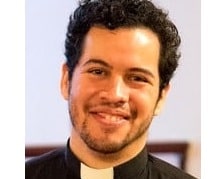When the sabbath was over, Mary Magdalene, and Mary the mother of James, and Salome bought spices, so that they might go and anoint him.And very early on the first day of the week, when the sun had risen, they went to the tomb.They had been saying to one another, “Who will roll away the stone for us from the entrance to the tomb?” When they looked up, they saw that the stone, which was very large, had already been rolled back. As they entered the tomb, they saw a young man, dressed in a white robe, sitting on the right side; and they were alarmed. But he said to them, “Do not be alarmed; you are looking for Jesus of Nazareth, who was crucified. He has been raised; he is not here. Look, there is the place they laid him. But go, tell his disciples and Peter that he is going ahead of you to Galilee; there you will see him, just as he told you.” So they went out and fled from the tomb, for terror and amazement had seized them; and they said nothing to anyone, for they were afraid.
Mark 16:1-8a
This last Tuesday, the daily office lectionary featured a passage from the end of Mark’s gospel, the first glimpse of the post-resurrection scene.
Mark is believed to be the earliest of the gospels written, due in part to its terseness: it has none of the finesse of Matthew and Luke; it doesn’t wax poetic about the nature of Jesus the Messiah like John. Depending on what Bible you happen to have, there is a good chance that you’ll find a couple notes within the last chapter of the Gospel of Mark. The first note will appear right in the middle of chapter 16, verse 8: “The Shorter Ending of the Gospel of Mark.” The second will appear right before verses 9-20: “The Longer Ending of the Gospel of Mark.”
Some early manuscripts have the shorter ending, others have the longer one. In trying their best to remain faithful to the text, translators chose to give us both. Tuesday’s passage stops just shy of the shorter end—with terror and amazement; silence and fear.
I’ve been thinking about the women’s response to the resurrection news this week. Here they were, in one of the most pivotal moments in human history—right at the center of the action—and their reaction, you might say, is less than ideal: they are afraid. They don’t know what to do, stunned into silence by news that sound too good to be true.
Maybe they are afraid about possible retribution still to come at the hand of Roman authorities. Maybe they are daunted by the responsibility this news places on them, as the first disciples commissioned to share it.
We know, however, that their reaction is nothing if not human. It is only natural to be afraid in the face of life-changing news; it is only natural to feel paralyzed by the prospect of disruption and change. The good news here is not that we shouldn’t feel this fear—far from it. Rather, it is what we do afterward that counts.
The women obviously didn’t remain silent. We wouldn’t have a record of the event if that were the case!
Let us give thanks to a God who meets us in our darkest night, even when we are afraid. Let us give thanks to a God who gives us the courage we need to take the next step.

—Fr. Javier

